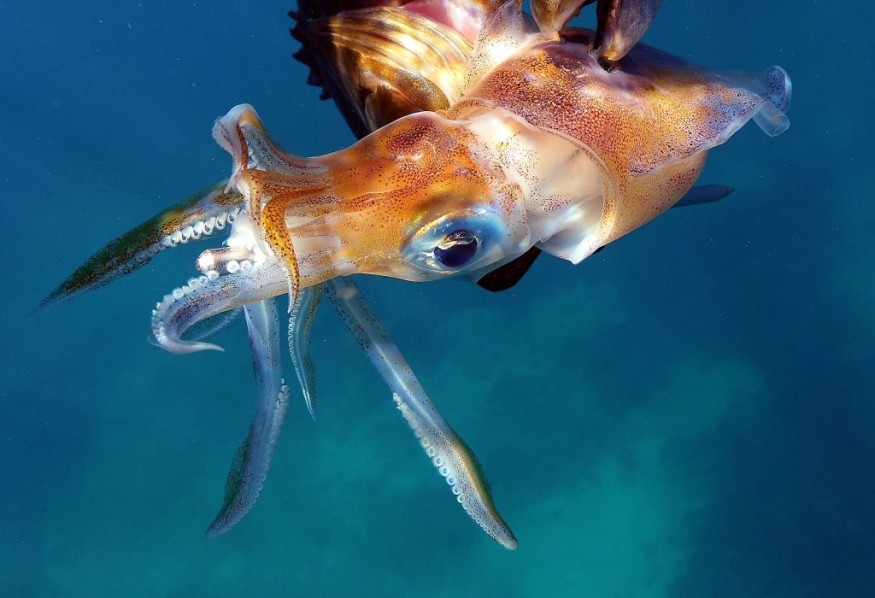Researchers from the American Museum of Natural History discovered some fossilized remains of a squid-like creature in Montana which lived 328 million years ago. The team identified it as a new species of vampyropod, an ancestor of the octopus.
MailOnline reported that the new species was named Syllipsimopodi bideni, after the 46th US President Joe Biden. Study lead author Christopher Whalen explains that he was encouraged by the plans of the US president to continue anthropogenic climate change and his general sentiment that politicians should listen to scientists.

A squid swims underwater off the shore of the coastal city of Qalamun, north of the Lebanese capital Beirut, on September 24, 2019.
Earliest Known Example of Vampyropod
Scientists wrote in their study, titled "Fossil Coleoid Cephalopod From the Mississippian Bear Gulch Lagerstätte Sheds Light on Early Vampyropod Evolution," published in Nature Communications, that the 328-million-year-old fossil is the earliest known example of vampyropod to date.
Before its discovery, the oldest known vampyropod lived 82 million years ago, ARS Technica reported. Vampyropods are soft-bodied cephalopods, including extinct and living animals like nautiluses and cuttlefish.
New species of extinct vampire-squid–like cephalopod is the first of its kind with ten functional arms https://t.co/84XpDBLY7R pic.twitter.com/dGd0N4XK70
— EcoTopical (@EcoTopicalNews) March 8, 2022
The fossilized remains of the squid-like creature were excavated from Bear Glutch Limestone in Montana. They were kept as one of the fossil collections of the Royal Ontario Museum, where Whalen and colleagues found it.
Fossils found in this area are exceptionally well-preserved and sometimes even show vascularization because of the impact of seasonal monsoons. The authors explained that heavy rainfall rapidly deposited sediments into the bay, feeding algal blooms. This created an oxygen-deprived zone temporarily, while the infusion of fresh water from the rain lowered the salinity of the water.
10-Armed Squid-like Creature Could Be A New Species
Whalen, a postdoctoral researcher at the Division of Paleontology at the Museum and a postdoctoral fellow at Yale University, said that the arm count of the fossilized creature is its most defining characteristic.
Study co-author Neil Landman, the curator emeritus of the Division of Paleontology of the Museum, believes that its 10 arms represent a new genus and species, supporting previous arguments that the ancestor of vampyropods also had the same number of arms.
Phys.org reported that octopus evolved to only have eight arms by eliminating two filaments that are vestigial arms of the vampire squid. Whalen emphasized that this fossil is the first confirmation that all ancient cephalopods possessed 10 arms.
The team also pointed out that two of the cephalopod's arms looked like they were elongated relative to the other eight appendages, and its torpedo-shaped body looked like modern squids. Since the characteristics of the fossilized cephalopod challenge the predominant arguments for the origins of vampyropod, Whalen and colleagues proposed a new model for coleoid evolution.
On the other hand, some paleontologists are still not convinced that it is a new species. The University of Zurich paleontologist Christian Klug told the New York Times that the specimen might represent a different known species, namely Gordoniconus beargulchensis.
But Whalen stands by his identification, noting that most cephalopods have a chambered shell that helps control buoyancy and the S. bideni lacks it. Instead, it shows evidence of a gladius present in today's squids.
RELATED ARTICLE: Did Octopus Come From Outer Space? New Study Claims Meteor Impacts Brought These Eight-Armed Creatures to Earth
Check out more news and information on Paleontology in Science Times.











